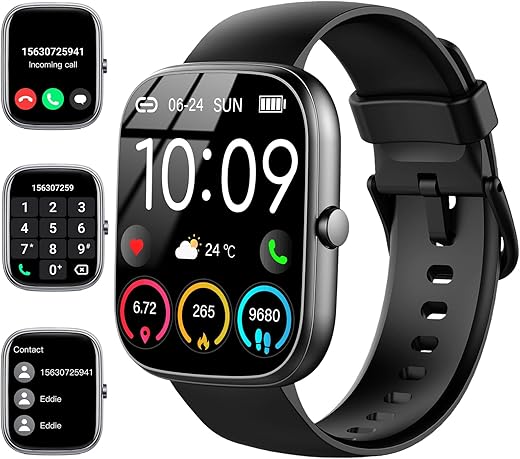
Fitness trackers with music control
It’s estimated that the global market for wearable devices such as fitness trackers is growing at an exponential rate, with a significant portion of these devices now incorporating music control functionality. Initially, fitness trackers were simple pedometers, designed primarily to count steps and estimate the calories burned during a day’s worth of activity. However, as they evolved, manufacturers began integrating more advanced features, such as heart rate monitoring, sleep tracking, and GPS capabilities, catering to a growing consumer demand for comprehensive health and fitness monitoring in a portable, wrist-worn device.
The addition of music control to fitness trackers is a relatively recent innovation that reflects the desire for a more holistic fitness experience. The first fitness trackers focused solely on collecting and displaying data, leaving the user to sort through figures and charts to make sense of their activity levels. With the integration of music control, users gained the ability to motivate themselves with their favorite songs, all directly from their wrist. The convenience of being able to skip tracks, play, pause, and adjust volume without ever having to reach for a smartphone during a workout has cemented the place of these devices in the fabric of modern exercise routines.
Statistics show that music can significantly boost workout performance by increasing stamina and setting an exercise rhythm. By incorporating the ability to control music directly from the fitness tracker, manufacturers have tapped into an aspect of the workout experience that resonates with people on a psychological level. Instead of merely tracking activity, these devices now contribute to the user’s mood and motivation, potentially leading to longer and more effective workouts. This functionality leverages the emotional connection that people have with music, using it to enhance the physical activity experience.
Nowadays, many fitness trackers with music control can also connect wirelessly to a variety of devices, including wireless headphones and home audio systems. This innovative development means that users can leave their phones behind and remain hands-free while exercising, which is particularly advantageous for activities like running, biking, and weightlifting, where carrying an additional device can be cumbersome and distracting. Furthermore, the ability to control music seamlessly from the fitness tracker exemplifies the ongoing trend towards greater device convergence – where single devices are increasingly expected to serve multiple purposes.
It’s clear that the ever-growing consumer desire for convenience and efficiency has propelled the advancement of fitness trackers from mere step counters into sophisticated, multipurpose companions. As the technology behind these devices continues to evolve, the integration of capabilities such as music control signifies a commitment by the industry to not just gather data, but to genuinely enrich the user’s exercise experience through the power of music.
How Do Fitness Trackers with Music Control Enhance Your Workout Experience?
Fitness trackers with music control seamlessly blend the worlds of fitness and entertainment, offering users the convenience to manage their workout playlists without ever having to reach for their smartphones or other devices. These advanced wearables not only track detailed fitness metrics such as steps taken, calories burned, and heart rate but also enable you to play, pause, skip, and adjust the volume of your favorite tunes with a simple touch or swipe on the device. The integration of music control in fitness trackers can significantly elevate the user’s workout routine by providing motivational soundtracks that are easily accessible, allowing for an uninterrupted and rhythmic exercise session that keeps you in the zone. The added motivation and ease that comes with having control over your soundtrack can potentially increase workout intensity and enjoyment, leading to better results over time. To discover the full range of benefits and the top fitness trackers with music control on the market, continue reading as we dive deeper into this harmonious integration of fitness technology and music management.
Fitness Trackers with Music Control Features
Fitness trackers with music control are wearable devices that cater to fitness enthusiasts who wish to monitor their physical activities while also having the convenience to manage their music playback without the need to directly interact with their smartphones or music players. The integration of music control functionality allows for seamless transitions between songs, volume adjustments, and even music selection.
Popular Fitness Trackers with Music Control
Among the various brands that offer fitness trackers with music control, some stand out due to their user-friendly interface, durability, and additional features. For instance, Fitbit has a range of devices such as the Fitbit Versa series which includes built-in music storage and playback controls. Similarly, the Garmin Forerunner series offers advanced running dynamics and also supports music controls. Apple Watch is another notable mention that not only excels in fitness tracking but also provides comprehensive music and podcast streaming capabilities.
Key Features to Look For
When shopping for a fitness tracker with music control, it’s essential to consider several key features:
- Compatibility – Ensure the device can sync with your music service provider, be it Spotify, Apple Music, or any other popular platform.
- Storage – Adequate storage for music is crucial if you prefer to leave your phone behind during workouts.
- Battery Life – Playing music can drain battery faster, so opt for a tracker that offers a long-lasting battery life.
- Wireless Connectivity – Bluetooth support is necessary for wireless headphone or earbud connection.
- Water Resistance – A water-resistant tracker is advantageous, particularly for swimmers or those who exercise in various weather conditions.
Controlling Music on Your Fitness Tracker
Using the music control function on fitness trackers typically involves connecting the device to wireless headphones or earbuds. Once paired, you control your music directly from your wrist, which may include pausing, skipping tracks, or adjusting the volume. The method of control will depend on the brand and model of the fitness tracker.
Impact of Music on Workout Performance
Music has been scientifically proven to enhance workout performance, which is why fitness trackers with music control have become prevalent. According to a study published in the Journal of Sports Exercise Psychology, synchronous music (music with a beat that matches the pace of the activity) can increase endurance during a workout by as much as 15%. By combining music control with fitness tracking, users are not only able to monitor their physical progress but also potentially enhance their workout performance and enjoyment.
As the demand for integrated fitness solutions continues to rise, the market for fitness trackers with music control is expanding. According to recent data, the global sports and fitness wearables market is forecasted to grow at a compound annual growth rate (CAGR) of approximately 5.3% from 2021 to 2026, highlighting the significance of these multifunctional devices in the lifestyle of health-conscious individuals.
1. Can fitness trackers control music on my smartphone?
Yes, many fitness trackers come with the capability to control music playback on your smartphone. You can usually play, pause, skip tracks, and adjust the volume directly from your fitness tracker.
2. What music services are compatible with fitness trackers for music control?
Compatibility varies by fitness tracker, but common services that can be controlled include Spotify, Apple Music, Google Play Music, and Pandora. Check the tracker’s specifications for a complete list.
3. Do I need to have my phone nearby to control music with my fitness tracker?
In most cases, your phone will need to be within Bluetooth range of your fitness tracker to control music playback. The typical range is around 10 meters (33 feet).
4. Is music control available on all fitness trackers?
Not all fitness trackers have music control functionality. It’s important to review the features of the tracker before purchasing if music control is a desired feature.
5. Can I store music on my fitness tracker and listen without my phone?
Some fitness trackers have built-in storage allowing you to store music directly on the device and listen via Bluetooth earphones without needing your phone. Check if the tracker supports onboard music storage.
6. How do I set up music control on my fitness tracker?
Generally, you’ll need to pair your fitness tracker with your phone via Bluetooth and configure the music control settings within the tracker’s companion app. Follow the specific setup instructions provided for your device.
7. Can I control volume with my fitness tracker?
Many fitness trackers that offer music control will also allow you to adjust volume directly from the tracker. Refer to your device’s features to confirm if this is possible.
8. Will using music control on my fitness tracker drain its battery faster?
Using music control can lead to faster battery depletion, as it involves Bluetooth activity. The impact on battery life varies depending on the tracker and usage frequency.
9. What should I do if music control is not working from my fitness tracker?
Ensure that your fitness tracker is properly paired with your phone and that the music app you are trying to control is supported. Also, check if there are any updates for your tracker or companion app. If problems persist, consult the manufacturer’s troubleshooting guide.
10. Is it possible to customize which music controls are available on my fitness tracker?
Some fitness trackers allow customization of music controls, such as choosing which gestures or buttons perform certain actions. Customization options can usually be configured within the companion app.
Conclusion: Enhancing Workout Experience with Music Control
Fitness trackers with music control have revolutionized the way we approach exercise, seamlessly integrating motivational soundtracks into our workout routines. These innovative devices not only track a plethora of metrics, such as steps, heart rate, and calories burned, but also empower users with the ability to manage their music without the need to manually handle their smartphones or other devices. The convenience of pausing, skipping, or adjusting volume directly from the wrist allows for a more focused and uninterrupted fitness session. Moreover, the psychological benefits of listening to music, such as improved mood and increased endurance, are leveraged to their fullest when users can easily control their playlists, helping them to push through challenging workout thresholds.
The market offers a diverse range of fitness trackers with varying degrees of music control functionality, catering to both casual exercisers and serious athletes. These wearables often include wireless connectivity, such as Bluetooth, which enables seamless pairing with headphones for a tangle-free experience. The integration of music control has been shown to significantly enhance user engagement with their fitness trackers, promoting consistent usage and, subsequently, a healthier lifestyle. By providing both real-time activity feedback and convenient music management, these devices ensure that users remain motivated, entertained, and immersed in their personal fitness journeys.






